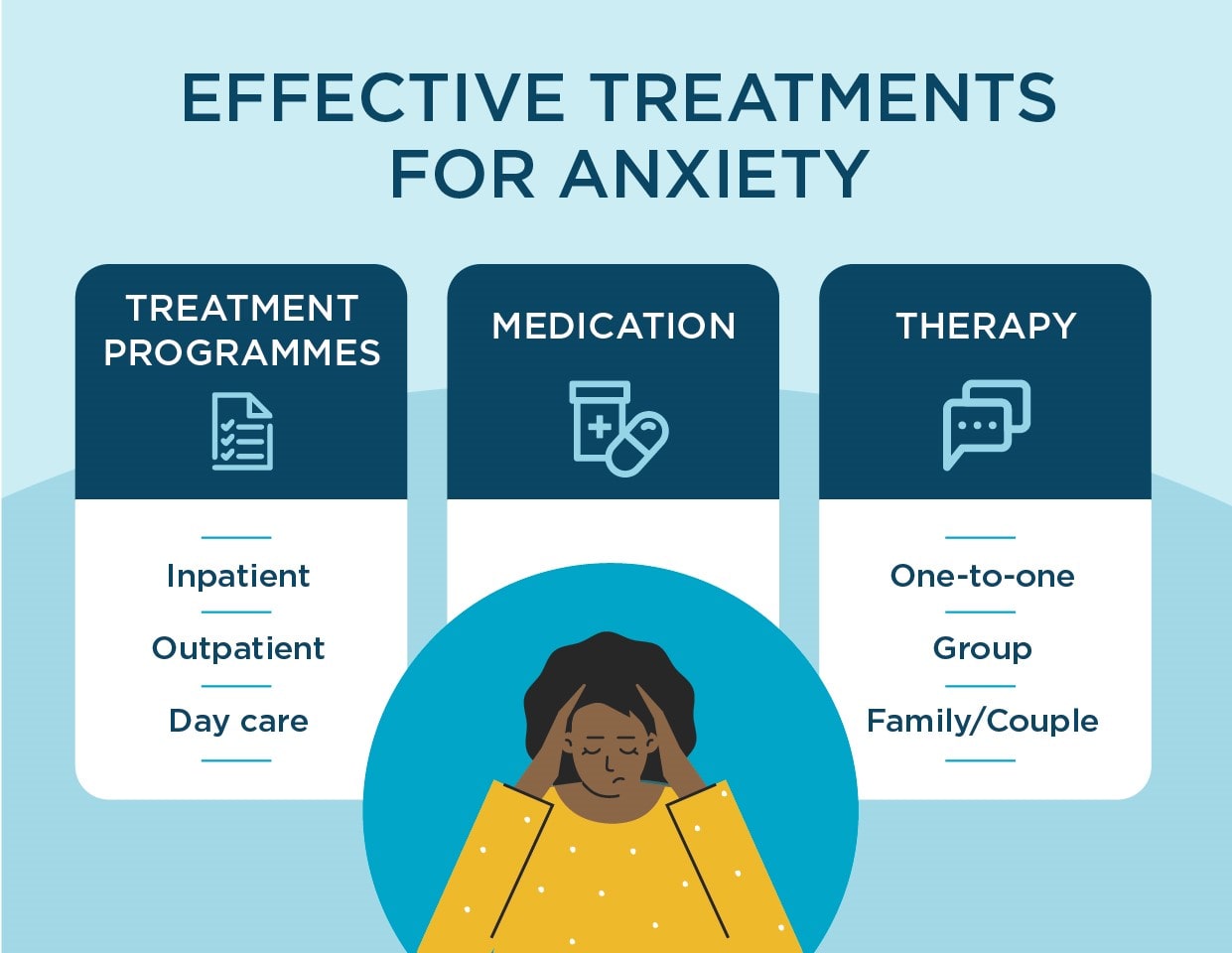Evidence-based counselling for anxiety with empathetic guidance
Evidence-based counselling for anxiety with empathetic guidance
Blog Article
Checking Out Various Approaches in Coaching for Anxiousness Problem for Enduring Change
When tackling stress and anxiety problems, it's crucial to discover a range of counseling strategies. Each method supplies distinct insights and tools to assist you handle your signs properly. You might discover that combining techniques can produce the finest outcomes. Understanding the nuances of these methods is vital to cultivating long lasting change. What if the appropriate mix could release a new degree of psychological well-being for you?
Recognizing Anxiousness Problems: A Quick Summary
Stress and anxiety conditions, which affect millions of people worldwide, can significantly impact day-to-day live. You may experience frustrating feelings of worry or worry that appear uncontrollable. These feelings can lead to physical signs like a racing heart, sweating, and even wooziness. Common kinds of anxiousness conditions consist of generalized stress and anxiety condition, panic condition, and social anxiety problem. Each has one-of-a-kind indications, however they all share a propensity to interrupt your regular and relationships.Understanding the source of your anxiousness is vital. It could come from genes, mind chemistry, or life experiences. Acknowledging your triggers can help you manage your feedbacks much better. It is necessary to bear in mind that you're not alone in this struggle. Many individuals face similar obstacles, and seeking assistance is a solid action towards feeling better. By discovering stress and anxiety conditions, you're already on the course to understanding and managing your condition much more effectively.
Cognitive-Behavioral Treatment: Challenging Negative Idea Patterns

Recognizing Adverse Idea Triggers
When you experience moments of distress, acknowledging the certain triggers behind your adverse ideas can be important in handling anxiety. Begin by focusing on scenarios that prompt sensations of concern or worry. Is it a congested room, an upcoming due date, or a conversation with particular individuals? Take down these circumstances in a journal. This will help you identify patterns in your thinking. Notification physical feelings that accompany your adverse ideas, like an auto racing heart or rigidity in your chest. By identifying these triggers, you obtain understanding into what's fueling your anxiousness. Understanding these links is the primary step in testing those ideas and inevitably regaining control over your psychological actions.

Replacing Ideas With Positives
Challenging unfavorable thought patterns is an essential action in changing your attitude and reducing anxiousness. You might usually locate on your own trapped in cycles of insecurity or tragic thinking. Rather than letting these thoughts dictate your sensations, practice changing them with realistic choices or favorable affirmations. When you think, "I can not handle this," shift it to, "I can handle obstacles one action at a time." This straightforward modification can considerably affect your mood. Routinely determining and responding to these unfavorable thoughts helps develop a much healthier internal discussion. Remember, it requires time and initiative, however constantly exercising this strategy can bring about long lasting modification, equipping you to encounter anxiousness with renewed self-confidence and resilience
Building Coping Techniques With Each Other
Changing negative thoughts is only the beginning of handling stress and anxiety efficiently. To create long-term change, you need to develop coping strategies that encourage you. Cognitive-Behavioral Therapy (CBT) assists you determine and challenge those unhelpful idea patterns. With each other, you and your counselor can check out just how these ideas impact your feelings and behaviors.Start by creating useful methods, like journaling or mindfulness exercises, that enable you to face anxiety head-on. When you face your anxieties progressively, you'll find out to respond differently.

Mindfulness and Acceptance-Based Approaches: Cultivating Present-Moment Awareness
As you navigate the complexities of anxiousness, including mindfulness and acceptance-based methods can significantly improve your ability to grow present-moment understanding. By concentrating on the right here and currently, you'll find that you can observe your thoughts and feelings without judgment. This technique aids you acknowledge your stress and anxiety without really feeling overwhelmed by it.Engaging in mindfulness workouts, such as deep breathing, body scans, or directed meditations, permits you to ground on your own in your present experience. Acceptance-based approaches encourage you to embrace your emotions as opposed to combat against them. When you approve your sensations, they lose their power over you.Incorporating these techniques right into your everyday regimen can change how you react to stress and anxiety. You'll establish resilience and learn to navigate stressful circumstances with higher simplicity. Eventually, growing present-moment recognition lays the structure for long-term adjustment, empowering you to lead an extra fulfilling life.
Exposure Therapy: Confronting Fears Slowly
Direct exposure therapy assists you face your concerns in a progressive method, making it much less frustrating. You'll find out strategies to face anxiety-provoking scenarios detailed, while additionally developing coping methods to manage your responses. This strategy empowers you to take control and lower anxiousness with time.
Gradual Exposure Methods
When check here dealing with anxiety, gradually confronting your worries can be an effective way to restore control. This technique, called gradual exposure, includes slowly subjecting yourself to the situations or items that trigger your stress and anxiety. Start with much less intimidating situations and progressively function your means approximately more challenging ones. For circumstances, if you're scared of public speaking, you may begin by speaking before a mirror, after that advance to sharing thoughts with a friend, and at some point attend to a little group. Each step aids desensitize you to the concern, developing your self-confidence in time. Keep in mind, it's essential to pace yourself and celebrate tiny triumphes as you move via this procedure, strengthening your capacity to take care of anxiety properly.
Structure Coping Approaches
Building efficient coping strategies is crucial for handling stress and anxiety, specifically as you challenge your concerns gradually. One effective technique is direct exposure therapy, where you begin by encountering your worries in a regulated fashion. Start with much less intimidating circumstances and gradually function your way up to more challenging circumstances. This steady direct exposure helps desensitize you to anxiousness causes, making them much less overwhelming.Incorporate relaxation methods, such as deep breathing or mindfulness, to soothe your mind throughout exposure. Track your development, celebrating tiny success in the process to improve your confidence. Keep in mind, it's okay to take your time; the objective isn't excellence yet constant enhancement. By developing these methods, you'll empower on your own to navigate anxiety and accept life extra fully.
Psychodynamic Therapy: Discovering Origin Causes of Anxiousness
Psychodynamic treatment explores the subconscious mind, exposing the root creates of your anxiousness - Counseling services for anxiety. By examining your ideas, feelings, and previous experiences, this strategy helps you discover underlying problems and unresolved problems that might add to your present anxiety. You'll work with a specialist to investigate childhood experiences, connections, and psychological patterns that shape your reactions today.As you acquire insight right into these much deeper layers of your mind, you'll begin to recognize how past events affect your present actions. This understanding can lead to catharsis, permitting you to refine feelings you could have suppressed.Through the healing relationship, you can also identify defense reaction that may have created gradually, offering a more clear path to transform. Ultimately, psychodynamic treatment furnishes you with the tools to resolve your anxiety at its core, advertising long lasting makeover in your emotional health
Integrative and All Natural Approaches: Combining Methods for Greater Efficacy
Integrating various therapeutic methods can boost your journey toward managing stress and anxiety better. By integrating aspects from cognitive-behavioral therapy, mindfulness techniques, and alternative strategies, you can develop a tailored strategy that resolves your special demands. For circumstances, you may use cognitive-behavioral methods to test adverse idea patterns while integrating mindfulness workouts to ground on your own in the here and now moment.Additionally, discovering holistic techniques such as yoga or reflection can promote leisure and reduce anxiousness symptoms. This blend allows you to establish higher self-awareness and resilience.Experimenting with these diverse approaches can aid you discover what resonates most with you. Remember, it has to do with discovering a harmony that works, instead than sticking to a solitary approach. This integrative technique not only provides prompt relief yet likewise cultivates lasting skills for handling stress and anxiety, equipping you to reclaim control over your life.
The Role of Support Equipments: Structure Durability Through Link
While it might seem that handling anxiousness is a solitary trip, having a strong assistance system can play an essential role in your resilience. Bordering on your own with empathetic buddies, family members, or support system produces a risk-free room where you can freely share your experiences and feelings. When you link with others, you advise yourself that you're not the only one in this struggle.These partnerships use support and can give practical coping techniques that have actually helped others. It's likewise a chance to acquire perspective; good friends can help you see situations differently, lowering feelings of isolation.Moreover, psychological support promotes a sense of belonging, which can significantly ease anxiety signs and symptoms. By leaning on your assistance system, you can develop strength and take on challenges extra effectively. Remember, reaching out for assistance is an indicator of strength, and it can make all the distinction in your journey towards managing anxiety.
Regularly Asked Questions
What Are the Typical Signs of Stress And Anxiety Conditions?
You could experience uneasyness, tiredness, trouble concentrating, irritation, muscular tissue tension, and rest disturbances. Physical signs can include rapid heartbeat, sweating, and trembling. Acknowledging these indicators early can help you look for appropriate support and therapy.

For How Long Does Therapy Usually Last for Stress And Anxiety Disorders?
Therapy for stress and anxiety conditions typically lasts anywhere from a few weeks to a number of months. It actually depends on your specific requirements, development, and the techniques your therapist utilizes to assist you handle your stress and anxiety effectively.
Can Medicine Be Used Together With Therapy for Stress and anxiety?
Yes, medicine can absolutely be made use of along with therapy for stress and anxiety. Integrating both approaches typically boosts therapy efficiency, aiding you manage signs and symptoms while discovering underlying problems with therapy. Constantly consult your doctor for tailored recommendations.
Are There Self-Help Methods for Handling Stress And Anxiety?
Yes, there are a number of self-help techniques for taking care of anxiousness. You can exercise mindfulness, involve in normal exercise, maintain a balanced diet regimen, develop a routine, and utilize deep breathing methods to help lower anxiety signs properly.
How Do I Know if I Need Professional Help for Anxiety?
You ought to take into consideration looking for specialist assistance for anxiety if it interrupts day-to-day live, creates considerable distress, or if self-help approaches aren't working. Count on your impulses; connecting can result in far better coping skills and assistance. Usual types of stress and anxiety conditions include generalized stress and anxiety disorder, panic condition, and social anxiousness problem. When you come across moments of distress, identifying the details triggers behind your adverse ideas can be vital in taking care of anxiety. Replacing adverse thoughts is just the beginning of taking care of anxiety efficiently. By analyzing your ideas, sensations, and previous experiences, this technique aids you reveal underlying disputes and unsolved problems that may contribute to your existing stress and anxiety. It's likewise a chance to gain viewpoint; good friends can help you see circumstances differently, reducing feelings of isolation (Counseling services for anxiety).Moreover, emotional support fosters a feeling of belonging, which can considerably reduce anxiousness symptoms
Report this page